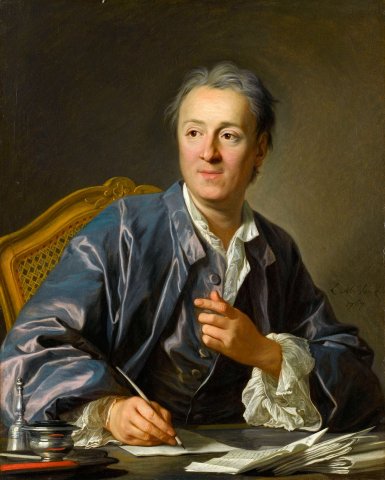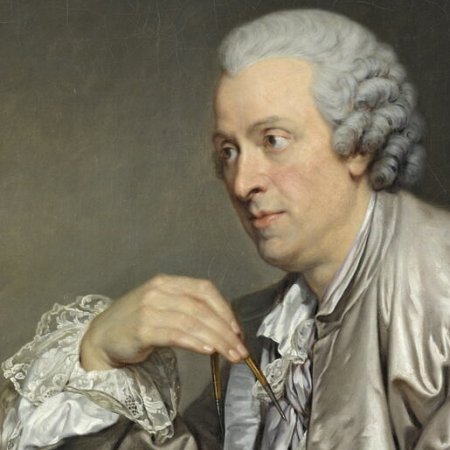Portrait of Diderot - Louis Michel Van Loo
Notice précédente Notice n°5 sur 104 Notice suivante
Description
Booklet from the 1767 Salon:
"By M. Vanloo, Ecuyer, Chevalier de l'Ordre du Roi, first Painter to the King of Spain, Director of the Ecole Royale des Elèves Protégés, former Rector.
N°1. [...]
8. The Portrait of M. Diderot."
Diderot's comment in the Salon of 1767:
Monsieur Diderot. Me. I like Michel; but I like the truth even better. Quite similar. He can say to those who don't recognize him, like the farmer in the opéra-comique: "It's that he's never seen me without a wig." Very lively. It's his sweetness, with its vivacity. But too young, head too small. Pretty as a woman, leering, smiling, cute, making the little beak, mouth in the heart. None of the colorful wisdom of Cardinal de Choiseul. And then a luxury of clothing to ruin the poor littérateur, if the collector of the capitation comes to impose it on his robe. The writing desk, the books, the accessories as well as possible, when you want the color to be brilliant and you want to be harmonious. Sparkling up close, vigorous from afar, especially the flesh. Beautiful hands, well modeled, except for the left, which is not drawn. We can see him from the front. His head is bare. His gray toupee and his cuteness give him the air of an old coquette who is still showing off. His position is that of a secretary of state, not a philosopher. The falseness of the first moment influenced everything else. It was that crazy Madame Vanloo who came to chat with him while he was being painted, who gave him that air and spoiled everything. If she'd sat down at her harpsichord and preluded or sung Non ha ragione, ingrato, un core abbandonato, or some other similar piece, the sensitive philosopher would have taken on a completely different character, and the portrait would have suffered. Or better still, leave him alone and let him reverie. Then his mouth would have parted, his distracted gaze would have wandered off into the distance, the work of his busy head would have been painted on his face, and Michel would have done something beautiful. My lovely philosopher, you will forever be a precious token of the friendship of an artist, an excellent artist, a more excellent man. But what will my grandchildren say, when they come to compare my sad works with this laughing, cute, effeminate, old coquet? My children, I warn you that it's not me. In one day, I had a hundred different faces, depending on what I was affected by. I was serene, sad, dreamy, tender, violent, passionate, enthusiastic. But I was never as you see me now. I had a large forehead, very lively eyes, rather large features, the head of an old-time orator, a bonhomie that closely resembled the stupidity and rusticity of the old days. If it weren't for the exaggerated features in the engraving based on Greuze's pencil, I'd be infinitely better. I have a mask that deceives the artist, either because there are too many things fused together, or because the impressions of my soul follow one another very quickly and are all painted on my face, and because the painter's eye does not find me the same from one moment to the next, his task becomes much more difficult than he thought. I've only ever been well done by a poor devil called Garand, who caught me, as happens to a fool who says a good word. Whoever sees my portrait by Garand, sees me. Ecco il vero Polichinello. M Grimm had it engraved, but he's not sharing it. He's still waiting for an inscription, which he won't get until I've produced something that immortalizes me. - And when will he have it? - When? Tomorrow perhaps. And who knows what I can do! I'm not conscious of having used half my strength yet. So far, I've just been wandering. I was forgetting, among the good portraits of me, the bust of Mlle Collot; especially the last one, which belongs to M Grimm, my friend. It's good. It's very good. It's taken the place of another one that his master M. Falconet had done, which wasn't very good. When Falconet saw his pupil's bust, he took a hammer and smashed his own in front of her. This is frank and courageous. As the bust fell to pieces under the artist's blow, it exposed two beautiful ears that had been preserved whole under an unworthy wig that Mme Geoffrin had had me put on afterwards. M. Grimm had never been able to forgive Mme Geoffrin for this wig. Thank God, here they are, reconciled; and this Falconet, this artist so unjealous of his reputation in the future, this determined contemptor of immortality, this man so disrespectful of posterity, delivered from the worry of passing on to it a bad bust.
1. Signed: "L. M. Van Loo / 1767"
Technical Data
Notice #000782



